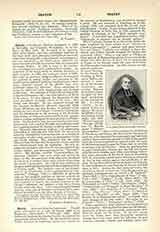

Gratz, Peter Aloys, schoolmaster and exegete, b. August 17, 1769, at Mittelberg, Allgau, Bavaria; d. at Darmstadt, November 1, 1849; received his elementary training in the monastic school at Fussen, studied classics in Augsburg, and in 1788 entered the clerical seminary at Dillingen, to take up the study of philosophy and theology. His student years were characterized by deep piety and an intense love of study. After his ordination to the priesthood, in 1792, he held the office of private tutor, and in 1796 was placed in charge of the parish church of Unterthalheim, near Horb, on the Rhine. In spite of his manifold parochial duties he found time to prepare several textbooks and other small works on Christian instruction, for use in elementary schools. Besides, being of a literary turn of mind and urged, no doubt, by the spirit of the age, he at the same time turned his attention to other occupations, choosing for his special field of labor New Testament exegesis. In 1812 he published “Neuer Versuch, die Entstehung der drei ersten Evangelien zu erklaren” (Stuttgart, 1812), in which he adopted the hypothesis of a Hebrew original as the basis of one of the synoptic Gospels. The learning and critical skill exhibited in this work attracted the attention of scholars, and won for him on 28 september of the same year the chairs of Greek language and Biblical hermeneutics in the University of Ellwangen. Recognizing his abilities and future usefulness, the University of Freiburg, in 1813, conferred on him the doctorate in theology.
During his professoriate in Ellwangen he published: (I) “Kritische Untersuchungen fiber Justins apostolische Denkwurdigkeiten” (Stuttgart, 1814); (2) “Ueber die Interpolationen in dem Briefe des Apostels Paulus an die Romer” (Ellwangen, 1814); (3) “Ueber die Grenzen der Freiheit, die einem Katholiken in der Erklarung der Schrift zusteht” (Ellwangen, 1817); (4) “Dissertatio in Pastorem Hermee”, in “Constanzer Archiv”, 1817, II, 224 sqq. On the amalgamation of the University of Ellwangen with that of Tubingen, in 1817, he accompanied the theological faculty thither, and continued his lectures on hermeneutics. Here he published his “Kritische Untersuchungen fiber Marcions Evangelium” (Tubingen, 1818), and with the cooperation of his friends Drey, Herbst, and Hirscher, founded in 1819 the Tubingen “Theologische Quartalschrift”, a publication which from its inception has enjoyed an uninterrupted existence.
The same year he received an invitation to the chair of Sacred Scripture in the newly erected faculty of theology in the University of Bonn. His reputation attended him here, and he lectured with great success. This, however, was of short duration. The university, though now free from the Rationalism and Febronianism which characterized the first period of its existence, was gradually undergoing the influence of a new movement known as Hermesianism, the originator of which was Georg Hermes, professor of theology and an intimate friend of Gratz. The high reputation of Hermes, the popular character of his lectures, as well as the fact that they were devoted to the examination of the philosophical systems of Kant and Fichte, induced Gratz to sympathize with his distinguished friend and associate himself with the new movement. The step was a fatal one. He regretted it deeply and desired to abandon his position in the university. All efforts to this effect failed, however, and at the instance of his more trustworthy friends he continued to lecture at Bonn till 1823. He remained a member of its theological faculty till 1826, and in 1828 was called to Trier, there to become a member of the municipal council and also of the school board. His success in this new field of activity was remarkable. He devoted all his time and energy to the reorganization of the studies, and to placing the schools generally on a higher scale of efficiency than they had hitherto attained. While in Bonn he published: (I) “Apologet des Katholicismus, Zeitschrift fur Freunde der Wahrheit and der Bruderliebe” (Mainz, 1820-24, 9 fast.); (2) “Novum Testamentum graeco-latinum” (Tubingen, 1820; Mainz, 1827); and (3) “Kritischer Commentar fiber das Evangelium des Matthaus” (Tubingen, 1821-23). This commentary, owing to the extensive use the author made of Protestant works, was severely attacked by Binterim and Gorres. Gratz replied in the sixth fascicle of his “Apologeten”, while his friends published in his defense “Drei offentliche Stimmen gegen die Angriffe des Pastors Binterim auf den Commentar des Professors Gratz, nebst drei Beilagen” (Bonn, 1825). He also undertook the continuation of the “Thesaurus juris ecclesiastici” of August Schmidt, S.J., which, however, remained unfinished.
JOSEPH SCHROEDER

